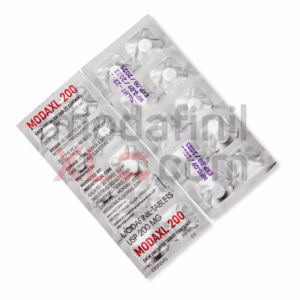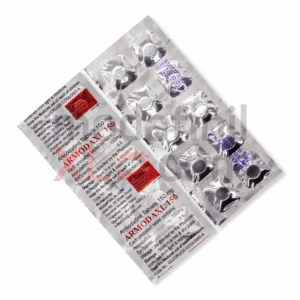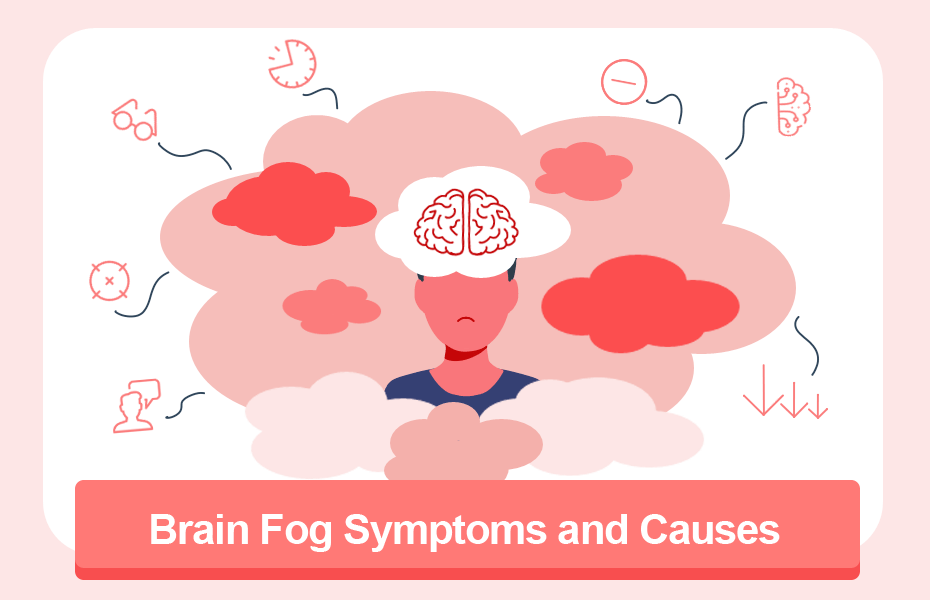Brain Fog Symptoms and Causes
Today every person is a multitasker until the day when the brain becomes less productive and passes its host foggy signals. Constant fatigue, distraction, and moodiness are the features of a brain fog, an unwanted side effect of our crazy life style.
Most people are too busy to pay attention to its signals until it interferes with work and other routine activities. It’s time to stop for a while and think about health.
What Is Brain Fog?
Brain fog is not a specific disease but rather a state that signals the presence of other medical conditions. It is related to cognitive dysfunction and may be also called mental fatigue. Depending on its severity, it may affect work, school, and other social activities.
Brain fog may linger for several days or weeks. Its main characteristic is a vague sensation of what a person is trying to retrieve, but cannot focus on it. The brain feels like it is wrapped in a blanket and cannot function clearly. The attempt to harness the thought is as draining as physical activity.
People with brain fog often have troubles managing the basic requirements in daily life. Simple tasks that should be done in a moment take an hour or longer. They often feel like they have blacked out or gotten lost in a well-known background, confusing the things they intend to take, etc.
There is little scientific information available to explain what is going on when the clouds roll in. Measures and tests for brain fog have not been invented yet.
Brain Fog Symptoms
The results of mental fog may be classified into several main categories:
- Memory. Brain fog causes short-term memory loss: forgetting where things were left, trouble remembering conversations, mixing up words, and even visual memory problems. Forgetfulness, subsequently, leads to embarrassment and/or anxious conditions.
- Difficulties in concentration and attention. Defocusing and a very short attention span are the brightest signs of brain fog. Studying and following multiple instructions become complicated and take a lot of time. Building long sentences during conversation is difficult.
- Embarrassment and gloominess. Individuals with brain fog often experience wrong days and miss appointments. Numerous mental confusions often lead to anxiety and depression.
These symptoms are often related to such illnesses as fibromyalgia syndrome, chronic autoimmune disease (lupus), and hepatitis C, and it is also common for cancer patients undergoing chemotherapy.
How Long Does Brain Fog Last?
The duration of brain fog is quite individual and directly related to an exact health problem. Depending on the cause, brain fog may last from a few minutes to a few decades.
For instance, the duration of brain fog caused by general anesthesia for surgery depends on the patient’s age, drug history, surgery duration, and general health condition, and thus, the fog may last up to a few hours. Brain fog caused by caffeine withdrawal depends on body size, health condition, and the amount of ingested caffeine, a combination that may last up to a few weeks.
It is necessary to identify the root causes of this condition on time and take the right measures.
How Is Brain Fog Diagnosed?
Persistent lack of clarity which worsens or does not improve is a reason to visit a doctor. Given that the condition may be caused by different health problems, it cannot be diagnosed by a single test. The physical examination starts with questions about:
- emotional state;
- ration;
- exercise;
- medical preparations or nutraceuticals.
A patient should inform doctor about all signs of health changes, such as:
- hair shedding;
- dry skin;
- fragile nails;
- weight gain.
Blood tests help to determine:
- abnormal levels of glucose;
- trouble in liver, kidney, thyroid work;
- undernourishment;
- infectious process;
- inflammatory disorders.
The results are illustrative and may guide to further examination. Among other diagnostic tools are:
- X-rays;
- magnetic resonance imaging (MRI);
- computed tomography scan (CT scan);
- allergy tests;
- polysomnography (sleep study).
Keeping a food diary helps to ascertain how foods affect a person’s individual brain fog.
Brain Fog Causes
There are numerous causes for brain fog. The list below represents what is brain fog a symptom of:
- attention deficit hyperactivity disorder (ADHD);
- excessive alcohol consumption;
- anxiety;
- nutrition;
- brain damage;
- workout;
- brain tumor;
- illicit drugs;
- acute psychosis;
- low libido;
- chronic fatigue syndrome (CFS);
- menopause;
- depressive states;
- diabetes;
- fibromyalgia;
- hormonal imbalances;
- underactive thyroid gland (hypothyroidism);
- Lyme disease;
- lupus;
- multiple sclerosis;
- neurodegenerative disorders (Alzheimer’s disease, dementia, Huntington’s disease, Parkinson’s disease);
- neurotransmitter imbalances;
- hypersomnia;
- laboring;
- post-traumatic stress disorder (PTSD);
- schizophrenia;
- adverse reaction of drugs;
- sleep loss;
- stress;
- withdrawal.
Sometimes brain fog causes are hard to diagnose, but with the help of a therapist, psychologist, or psychiatrist, a patient will receive qualified assistance.
Eating the Wrong Foods
The type and quality of food directly impacts the brain’s work.
The list below represents the worst products for the brain that should not be a part of a person’s diet or used in limited amounts:
- processed foods (breakfast cereals, tinned vegetables, snacks, crisps, sausages);
- trans-fat (margarine, crackers, cookies);
- foods with monosodium glutamate (Asian cuisine, fast-food, potato chips, frozen dinners, mayonnaise sauce);
- added sugar (sodas, energy, sport drinks);
- fructose (corn syrup, sweetened yogurt, breads, canned fruit, juice, boxed dinners, granola bars);
- saturated fat (butter, suet, heavy creams, hard goat’s cheese, pepperoni);
- artificial compounds (preservatives, colorants, artificial flavor, and texturants);
- a lot of caffeine;
- salt (3,091 milligrams a day or more);
- soy sauce;
- fast food (French fries, burgers, nuggets).
- buttery popcorn;
- alcohol.
Controlling your diet is healthy and very beneficial for your mental health.
Low-Fat Diet
The brain is the fattest organ, consisting of 60% fat. Filling it with energy is essential for viable mental condition. Those who eat low fat products that include cholesterol have been ruining health. Good fats are the most infallible form of energy that our brain is usually starved for.
The lab test can help to determine the condition of the brain’s health. To correct this situation, a brain fog sufferer should firstly find out the best sources of good fats that decrease inflammation processes and improve brain health.
Arachidonic and docosahexaenoic acids (the forms of fat) are extra important for brain health. The sources of these fats are meat from grass-fed animals and wild-caught fish.
Among plant-based fats, coconut oil is vital for brain functioning. The medium chain triglyceride (MCT) found in coconut oil significantly improves the ability to process thoughts. Monounsaturated fats (extra virgin olive oil, avocados) are very good for the brain, too.
Years of poor diet requires time until the organism adjusts to eating healthy fats. Therefore, good fats should be added to the diet slowly.
Food Additives and Artificial Sweeteners
The food additive monosodium glutamate (MSG) enhances products’ taste and flavor. It is a component of almost all precooked and junk foods. Products with MSG make people experience worsening of health which are short-term, lasting up to several days, and brain fog.
The active substance in MSG is free climatic acid that is converted to glutamate during digestion. Glutamate is a chemical agent, high doses of which are poisoning to the brain and cause the cells dying. It also overloads powerful antioxidants (depletes glutathione and others) that scavenge free radicals in the organism. To improve mental health, it is necessary to choose unprocessed foods and eat products with few ingredients.
Artificial sweeteners (like aspartame) are not useful for the brain either. After ingestion, they are converted into aspartic acid, phenylalanine, and methanol, large amounts of which agitate the brain cells and lead to their deaths. Methanol further breaks down to formaldehydes that are neurotoxic and carcinogenic.
Aspartame toxicity leads to sore head and mental disorders.
«Wheat Brain»
Can gluten cause brain fog? Yes, it can. Wheat has been hybridized, and it is no longer the same as the wheat our ancestors ate. Nowadays, wheat contains large amounts of gluten, which is hard for the organism to break down and is not always digested completely. It triggers an immune reaction, causing brain fog, weakness, inflammatory processes, as well as muscle and joint ache. Gas and flatulence are clear signs of gluten intolerance.
For brain fog treatment, gluten should be removed for at least three weeks. There are plenty of gluten-free products in the market that are baked from whole grains and contain fiber. Avoid products made with processed rice flour or potato starch as they are highly glycemic and increase the amount of sugar in the blood. It is best to eat quinoa, buckwheat, and brown rice. If rejecting gluten completely is unacceptable, just decrease its amounts.
Caffeine
The benefits of coffee are known worldwide. Its immediate stimulating feature in just a quarter of an hour helps to wake up in the morning, improves attention and mental abilities, and even enlivens mood. These effects last 3-7 hours, depending on the dose. Caffeine in moderate amounts helps to relieve brain fog signs, but excessive consumption may complicate it further.
Extended consumption means 500 mg of caffeine and more. Such doses often cause brain fog, sleeplessness, nervousness, lack of concentration, disturbances, and other unwelcome symptoms. They may appear within a few hours after the last caffeine dose. This condition stirs a person up to drink more caffeine in order to improve the mental state. Caffeine withdrawal may also be a cause of brain fog.
Food Allergies
It is scientific fact that proteins found in some foods activate inflammatory processes in the nasal cavity, causing allergies. The severely irritating products are:
- wheat;
- fish;
- shellfish;
- monkey nut;
- hazelnut;
- soy;
- milk;
- eggs.
An inflamed sinus starts swelling, pressing on the head zones: eyes, forehead, and cheeks that become touch-sensible. The pressure makes a person feel absolutely exhausted.
Nasal congestion causes brain fog and leads to migraines and postnasal drip (mucus that drips down the back of the throat causing cough and sore throat).
Brain fog resulting from the blockage of the nasal passages should be treated by nonprescription medications, such as antihistamines, decongestants, and analgesics, on the basis of a physician’s advice.
Dehydration
Drinking water and brain functioning are inextricably linked. Dehydration leads to foggy mind, migraine, rage, depressive states, concentration problems, and forgetfulness. Since 70% of our body consists of water, each organ is water-related, including the brain and nervous system. 1% of water deficiency increases cognitive disorders in 5 times.
To provide optimal conditions for the brain’s activity, drink 360-480 ml of water in the morning. A bottle with clean water should be always near, and this is particularly true for workers whose job demands high mental activity. Regular water consumption fills the brain with oxygen and energy.
For renewal of the water balance, the quality of the liquid is very important. Filtered, bottled, distilled, or reverse osmosis water is highly recommended. Water can not be replaced by other drinks like coffee, milk, or juice.
Food Chemicals
Nearly every product may cause intolerance that leads to brain fog; it is natural food chemicals fault.
These are:
- salicylates (an organic acid found naturally in plants that acts like immune hormone, protecting them from harmful bacterias);
- amines (organic chemistry produced during fermentation, enhances food flavor);
- glutamate (the sodium salt of glutamic acid that protein foods naturally consist of);
- gluten (a type of protein found in wheat and other grains).
Here are a few tips how to avoid the toxic chemicals in food:
- limit canned food and plastic containers;
- avoid non-stick pans;
- filter drinking water;
- buy organic when possible;
- avoid food dyes.
In some cases distinguishing food allergy from food intolerance is problematic. Choose only the foods of high quality for your meals.
Nutritional Deficiencies
Brain fog is often a result of nutritional deficiencies. The brain requires about 130 g of carbohydrates to maintain a proper energy level, but the carbs cannot be formed into energy without B vitamins. The deficiency of at least one B vitamin makes synthesizing impossible.
Just a few foods are not enough to fill the organism with all the necessary vitamins for good brain’s work. Vitamin B12 exists only in animal sources or enriched foods, folate is in leafy greens, and niacin comes from red meat, fowl, or fish. A balanced meal is the best way to improve mental health and avoid brain fog. The daily diet should include fruits and vegetables, lean protein, and whole grains. The deficiency of B vitamins can be restored through fortified foods and nutraceuticals.
Vitamin D Deficiency
Low levels of vitamin D are often found in people with autoimmune disorders that subsequently cause brain fog and other general cognitive impairments. Scientific evidence suggests that the lack of vitamin D can affect people of all age-groups in many ways. The importance of the «sunshine vitamin» to mental health needs more research. However, a 25(OH)D blood test can show the vitamin level in the organism. Insufficient levels should be fulfilled through supplements and other methods. There are many methods to restore its level, for instance:
- spend about 20-25 minutes under the sun;
- eat fatty fish (salmon, char, scomber, tuna, eel);
- choose the mushrooms that were grown in ultraviolet light (portobello);
- drink fortified milk;
- drink fortified juice (check the label for vitamins info);
- eat fortified cereal;
- use cod liver oil or other supplements;
- resort to UV-emitting lamps and bulbs after medical recommendation.
Beef liver and egg yolks also contain vitamin D, although these should not be used as a single source of it due to their high levels of cholesterol.
Omega-3 Essential Fatty Acids
The advantages of omega-3 fatty acids for enhancing memory and general mental condition are scientifically proven. The fats are not produced in the organism themselves, therefore it is extremely necessary to receive them from external sources. Omega-3s are contained in crop and livestock products, though each has a different form of it.
The most valuable omega-3 fatty acids are eicosapentaenoic acid (EPA) and docosahexaenoic acid (DHA). The second is answerable for the brain’s work and emotions, and its low rate is linked to serious mental disorders.
These acids are highly concentrated in the brain and play important role for mental and behavioral processes. The deficiency of omega-3s leads to mood changes, depressive states, and cloudy thinking. Among benefits for mental condition, omega-3 lowers the risk of about 50 ailments, among which are autoimmune disorders, heart diseases, cancer, joints inflammations, and diabetes. The anti-inflammatory features of omega-3s help to overcome abnormal anxiety and serious mood disorders, as well as increase concentration. An effective omega-3 supplement is fish oil.
Vitamin B12 Deficiency
Vitamin B12 is one of several B vitamins that protects organisms against many ailments and is indispensable for the work of the brain, nervous system, and physiological processes. B12 is vital for clear memory, focus, and attention. The deficiency of this vitamin inherent in depression sufferers leads to the conclusion that the vitamin takes part in the formation of the mood enhancing chemical messengers. The lack signs include:
- cloudy thinking;
- loss of memory;
- depressive state;
- fatigue;
- disturbance;
- embarrassment;
- bewilderment;
- sick fantasies;
- decreased appetite;
- costiveness;
- short breath;
- tingling extremities.
Vitamin B12 is found in animal foods (fowl, pork, fish, clams, liver, eggs, etc.). Vegans commonly suffer from the lack of this vitamin and can get it only from seaweed (spirulina), fermented soy products, and ale yeast.
Lack of Qualitative Sleep
Lack of sleep is a reasonable explanation for foggy brain. The scientists observed the behavior of brain cells in people not having enough sleep and noticed that it is kindred to the comedown that happens after alcohol usage. In people who sleep badly, the brain cells work slower during cognitive tasks, and the response is weaker and worse than in a rested brain.
It appears that definite brain regions also snooze while a patient is awake. The deprived brain showed laggard somnolent waves that disrupted the brainwork and implementation of activities. Scientists explain this fact by the dozing of certain brain cells which caused mental faults, while the rested brain cells had enough rest and ran in the usual regime.
Lack of quality sleep negatively impacts such psychological parameters as mental processes, attentiveness, temper, memory, reaction time, and decision making. Even a reduced sleep period can have significant fallout. Constant lack of sleep endangers physical health, causing obesity, inflammatory processes, diabetes, and heart illnesses.
Anxiety, Chronic Stress and Depression
According to scientific research of anxiety, experiencing stress over a prolonged period amplifies inflammatory processes in the brain that often manifest themselves in brain fog and forgetfulness. The tests done on rodents showed that stress changes the brain and its immunity.
The hippocampus zone of the mice’s brains (purple color) affects orientation ability and shows depressive types of behavior.
When the mice were given an anti-inflammatory drug, the memory loss and inflammatory agents disappeared, though the symptoms of depression remained. This means that post-stress memory is directly connected with inflammation and immunity.
In humans, high levels of stress hormones stimulate the brain’s electrical activity, suppressing the cortex and increasing reaction to danger. The hippocampus is a learning and memory region of the brain. Continual agitation and stress response consequently change the brain’s functionality. Elevated stress depletes the organism’s sources, causing quick tiredness and mental disorders.
Physical Inactivity
Physical inactivity means weak blood circulation, delays in producing endorphins (the wellness hormone), and poor brain oxygenation. To keep the brain healthy there is no need to run a marathon. Choosing stairs instead of the elevator or walking a few miles would really help.
Exercise is a perfect way to protect and enhance a person’s mental health. The key strategy is regular exercise of moderate intensity.
The real benefits of sport for the brain’s work are:
- maintaining healthy blood pressure;
- improving energy;
- lifting the spirits;
- lowering stress and disturbance.
Exercise stimulates the brain regions that are involved in memory function, releasing a chemical brain-derived neurotrophic factor (BDNF). It is not available in a pill, but it can be produced by the brain during sport performance. The ideal training scheme is half an hour, 5 times a week. The maximum heartbeat is approximately 220 beats per minute minus your age.
Brain Fog Caused by Toxins and Heavy Metals
Every day we collapse with the potent sources of heavy metals that accumulate in the human organism and have implications for a myriad of symptoms of brain fog. The table below represents the heavy metals, its main sources, and suggestions for removal.
| Heavy metal | Source | Detoxification |
| Cadmium | Tobacco; chemical additives; excessive cacao and coffee usage. | Quit smoking;
eat organic food; check out the cacao and coffee for cadmium before buying. |
| Lead | Soil and water (especially in industrial areas); protein powders; lipsticks; some cocoa products. | Eat organic food;
buy pure water or install osmosis filter; use filtered water for domestic needs (shower etc). |
| Arsenic | Tobacco; agriculture pesticides (particularly, rice); protein powders; underground water. | Eat organic food;
exclude rice, eat quinoa and buckwheat instead; store shoes in a closet, keep the floor clean. |
| Mercury | Dental amalgam; vaccines; seafood | Examine the vaccines thoroughly;
choose small fishes; apply for full rehabilitation of oral cavity with non-mercury containing. |
| Fluoride | Mains water; street coffee and food; dentifrice. | Drink clean water, do not use carbon filters;
use natural dentifrice. |
| Aluminium | Medical preparations; antiperspirants; foil; canned food. | Research the vaccines thoroughly;
Use non-aluminum cosmetics; store food in glass or ceramic utensil. |
| Copper | Water; food; air. | Avoid foods high in copper;
drink a lot of pure water; detect the copper source at home (like pipes) and get rid of it. |
Visit a nutritionist or naturopath to test the levels of heavy metals’ intoxication.
Mercury
The brain and nervous system are particularly vulnerable to mercury toxicity. High mercury levels cause immunodeficiency disorders, weariness, agitation, depression, heart and blood diseases, among many other health problems. Removing the mercury from an organism is absolutely real and safe.
It is very important to visit a biologic dentist that has skills in low remission removal. Mental toxicity tests help to estimate the toxicity levels. The professional healthcare provider should instruct you what to do in each particular case. Under control of a qualified specialist, brain fog caused by mercury intoxication will be recovered.
Copper
Even being a vital-for-good-health element, excessive copper levels negatively impact both physical and mental health. The copper toxicity happens due to many factors, such as:
- numerous estrogens;
- birth control methods;
- high copper ration;
- stress.
High copper levels become a powerful reactive toxin that leads to brain fog, chronic fatigue, depressive states, panic attacks, paranoia, hallucinations, Alzheimer’s, schizophrenia, and cancer.
Among the most efficient ways of detoxing from copper are elimination of its source, using zinc, manganese, vitamin B, and C supplements, avoiding foods with high copper levels, and drinking a lot of water.
Other Toxic Metals
There are many ways to measure heavy metals which vary from practitioner to practitioner on what they feel is the best. The available options are hair, urine, blood, and sweat, although the fluid substances have low effectiveness in long-term observation due to constant flux. These results are current and limited by a few hours or days.
Inductively coupled plasma mass spectrometry (ICP-MS) is an analytical technique where hair becomes a diagnostic tool. Its multiple measurements allow the detection the presence of nutritional and toxic trace substances reliably, accurately, and noninvasively. The test is easy, convenient, and very affordable.
Can Mold in Your House Cause Brain Fog?
Not many people know what is the negative effect of mold on the brain. Mold is a dangerous toxin that releases poisonous gas that is spread through the air.
When its spores enter a human’s body via skin or air, the poisonous gas affects the brain and other organs, causing psychological disorders and other negative for health reactions.
Such as:
- stress;
- fatigue;
- changes of contact sensations;
- muscles fatigue;
- dizziness;
- discoordination;
- brain fog;
- breathing disorders;
- digestive tract problems.
The effects of mold are long-term, often misdiagnosed, and mistreated. These states require a comprehensive assessment. The most important steps in treatments are:
- detect the source and stop the exposure;
- to take detox measures;
- increase the vitamin D rates.
Some clinics use single-photon emission computed tomography (SPECT) imaging, which is a technique for brain evaluation. The SPECT results of how the mold infection looks in the brain are represented in the picture. You can receive qualified help at a medical center.
Medications
Brain fog and blackouts may be caused by side effects of prescription and non-prescription drugs of various forms, such as pills, solutions for injections, skin patches, and suppositories. The table below shows the medicines which more often than not lead to mental problems.
| Drug | Assignment |
| Lipitor, Lescol, Mevacor, Pravachol, Crestor, Zocor | Cholesterol-lowering drugs (statins) |
| Diamox, Tegretol, Potiga, Neurontin, Lamictal, Keppra, Trileptal, Lyrica, Banzel, Topamax, Depakote, Zonegran | Antiseizure |
| Anafranil, Norpramin, Tofranil, Pamelor, Surmontil, Sinequan, Elavil, Vivactil | Antidepressants (tricyclic) |
| Duragesic, Vicodin, Dilaudid, Astramorph, Percocet | Narcotic painkillers |
| Apokyn, Mirapex, Requip | Dopamine agonists (Parkinson’s disease) |
| Tenormin, Timoptic, Coreg, Inderal, Betapace, Lopressor | High blood pressure (beta-blockers) |
| Ambien, Sonata, Lunesta | Sleeping pills |
| Enablex, Myrbetriq, Ditropan XL, Vesicare, Detrol, Sanctura | Anticholinergics |
| Dimetane, Clistin, Chlor-Trimeton, Tavist, Benadryl, Vistaril | Antihistamines (first generation) |
| Valium, Xanax, Ativan, Dalmane, Librium, Klonopin, Versed, Doral, Restoril, Halcion | Benzodiazepines (anti anxiety) |
| Dilantin | Epilepsy |
| Quinidine | Arrhythmia |
| Naproxen | Inflammatory processes |
| Quinolones | Antibiotics |
| Infergen | Interferons |
| Humalog | Diabetes |
The list is provided for information and does not include all drugs that cause brain fog and mental disorders. Receive a medical consultation regarding each particular drug.
Brain Fog Caused by Drugs Intake
Those who suspect that mental problems are caused by the intake of any drug should ask medical advice. Here are a few helpful tips:
- Write down all medicines you have been taking, as well as their dosages and period of usage.
- Describe your problem to your physician/physicians (if you are under control of several specialists).
- Find out the consequences of stopping the preparation that provokes brain fog.
- Discuss the possibilities of switching the preparation, possible interaction and individual dosages.
- Follow medical recommendations further.
If preparations cannot be switched, the brain fog effect may be lessened by having healthy style living points, such as brain-healthy rations, getting enough rest, physical exercises, stress management, and brain supplements.
Brain Fog and Infections
A healthy body has a strong immunity that rejects minor infections but not major ones, as they are stealthy and can lie dormant manifesting insignificant symptoms. When an organism weakens, stealthy infections become more active and manifest as severe signs. The fight between an organism’s defense and major infections may last a long time. Systemic candida, chronic hepatitis, and Epstein Barr are a few stealth infections that can attack at any time causing numerous symptoms including brain fog.
A patient needs the help of a holistic physician who will determine through various tests the microflora state, type of pathogen, food intolerance, possible hormonal problems, and other important issues for complete treatment.
Viruses
Such infections as viruses are often latent and manifest themselves after stressful factors exposure. They negatively impact the immune system making it more sensitive and unresponsive with all the unwelcome consequences, including brain fog.
Severe immunodeficiency sufferers struggle hard with controlling viral infections. Since a person cannot get rid of it, the only one way out is to correct the immune system. Natural Killer (NK) Cells testing is an efficient tool in controlling and handling all infection types, including viral. According to the result, a therapist suggests an individual scheme of care.
Fungal
Candida is the most common cause of fungal infections worldwide, and fungal infections are common sources of mental fog subsequently. Candida appears in the organism due to immunodeficiency, and the inability of the organism to resist such environmental triggers as stress, foods of poor quality, antibiotics, and others.
Those who have just finished the antibiotics course and find themselves plagued by brain fog should consider candida as a root cause. Chronic brain fog sufferers are often living with candida or other infections.
This state requires a complete medical examination and the help of a qualified specialist.
Parasites and Protozoa
Rare in the developed world, parasitic infections may also cause serious mental health problems. These are:
- Protozoa. Present in bodies of water, the parasites infect the brain of their host.
- Blastocystis hominis. Appears in humans due to poor hygiene, dirty water or food, or contact with animals.
- Taenia solium tapeworms. Lives in the digestive tract. Often comes to the human organism through pork.
- Trichinella spiralis (roundworm). Lives in warm ponds. Traveling up the nose, it enters the brain and destroys its tissues.
- Loa loa (a worm in the eye). It stems from the bite of deer and mango flies.
- Toxoplasma gondii. Reproduced in conditions created by felines.
Most infections demand medical help or urgent hospitalization.
Bacteria
Mental fog may be caused by a bacterial infection. The infection can be identified in the laboratory and treated by targeted drugs, such as antibiotics. Herbal and other remedies are too weak and are not recommended.
Severe forms of cognitive dysfunctions such as Alzheimer disease show strong evidence of bacterial etiology. Comprehensive treatment is highly suggested.
Disorders That Can Cause Brain Fog
The disorders that can cause brain fog are diverse and numerous. Foggy mind is associated with physical and mental disorders. Since cloudy thinking is just a single symptom, those who experience this condition should pay attention to other concomitant symptoms, as this will guide a person to what ailment it is possible related.
Brain fog suffers should not underestimate the condition, especially if it is bothersome for several days or weeks. It may be a sign of serious problems which occurred in the organism. The sooner a person realizes where it comes from, the better the chances are for quick improvement without complications.
Do not try to diagnose on your own, as the brain mechanism is too complicated. The help of a qualified specialist will help to exclude wrong brain fog reasons, detect the «root cause», and guide you to the correct treatment.
Chemo Brain
The meaning of chemo brain implies mental health disorders that occur after chemotherapy. The reasons for memory problems are not yet fully understood. Possibly, they are explained by the illness progression, cancer treatment and complications that occur afterwards, or emotional response to the therapy. Scientists have been trying to understand the brain changes that happen in cancer sufferers.
The severity and duration of chemo brain symptoms vary individually. Some patients return to their job performances but experience concentration difficulties, while other patients cannot work at all. Consultation of an oncology specialist is urgently needed.
Thyroid Disorders
Many thyroid patients experience brain fog. It’s not weird, as the sufficient level of the thyroid hormone is essential for proper brain functioning. Low active thyroid without treatment may become a reason for cloudy thinking and other brain fog symptoms.
Those who treat thyroid conditions and experience brain fog should consider changing the scheme of thyroid care, because it is possibly not optimal.
The first right step is to have a complete thyroid examination. Thyroid patients should check their iron levels in order to determine if they need iron supplements or correct the thyroid scheme of cure.
Yeast Infection
Yeast infection, found in the genitals and other areas of the skin or the mucous membrane, can worsen the physical and mental conditions. Candidiasis is the most common type of yeast infection. Its most common symptoms (irritation, burning feeling, painful sexual intercourse, cheese-like ooze) may be complicated by the brain fog signs (weakness, low energy, gloominess). Using antidepressants, energy enhancers, and a lot of coffee are big mistakes that usually lead to severe infection progression.
It often appears in people with weakened immune system and becomes a valid reason to visit a health care provider—the sooner, the better. Taking any form of yeast infection seriously will help to exclude aggressive infection signs that often require hospitalization for complete treatment.
Gluten Intolerance
Wheat and bakery products are the main sources of gluten, although they are not the only ones. When neurological disorders appear with no clear cause, gluten could be to blame. Recent scientific research proves that there is a direct link between gluten and brain health due to the wide range of its activity in the organism, from inflammatory processes to neurotoxic. Unfortunately, most gluten-sensitive people remain undiagnosed.
The gluten structure is similar to the brain tissues. When the immune system attacks the gluten in blood, it confuses brain tissue with gluten and accidentally invades the brain and nerve cells, too.
Another destructive function of gluten consists in disrupting the balance of good and bad bacteria in the digestive tract. Those who experience brain fog and other mental disorders with no specific reason should test their gluten sensitivity to find out how to manage it.
Allergies and Histamine
All of us are familiar with allergies, but what is a histamine and how does any of this connect with brain fog?
Histamines are the chemicals produced by an immunity system that fight with an allergen. It is those who make a person sneeze and tear up. Brain fog is a part of the histamine production which is often caused by the lack of ferment for histamine break down or oxidative stress.
Elevated histamine levels are usually suppressed by antihistamine drugs which do not block histamine production but only occupy the receptors where histamines cannot act. The explosion of unfelt histamines occurs when the antihistamine drug stops working due to built up tolerance. Negative histamine effects become noticeable immediately. The signs of overloaded histamine are brain fog, weakness, disturbance, and palpitations.
The consultation of an allergy specialist is required.
Leaky Gut and Dysbiosis
Leaky gut is a state when the intestinal wall becomes overly porous with cracks and holes in it. As a result, undigested food, toxins, and bacteria in the blood trigger inflammation throughout the body and brain.
Bacterial dysbiosis leads to releasing toxic molecules (lipopolysaccharides) that are related to mental problems. The connection between the gut and the nervous system got the name gut-brain axis or «second brain». Weakened gut health contributes to brain fog and becomes the root cause of severe psychological conditions and inflammatory processes in the brain.
Healing the brain should start from healing the gut and reducing inflammation as soon as possible. The gut treatment requires global lifestyle changes, healthy diet, using probiotics, and other measures that help to renew the healthy gut bacteria.
Hormonal Imbalance and Menopause
One third of middle-aged women experiences cognitive dysfunctions. The condition is mostly explained by a hormonal imbalance that occurs around menopause due to decreased estrogen levels. According to the study, this chemical is connected with memory function and attention.
Other scientists supported the idea that cognitive dysfunction in middle-aged females appears due to natural biological reasons that detriment memory and concentration. For whatever reason, cognitive functions tend to worsen with age and depend on the individual’s health state.
There are natural ways of treatment, unless this condition is caused by other illnesses. Healthy living style, sports, brain training exercises, and supplements that correct estrogen imbalance are very helpful issues.
Bowel Toxicity
Bowel toxicity creates the wrong conditions for brain functioning and can be considered as a cause of cognitive disorders. The undigested food that gets stuck in the intestine tract creates conditions for producing toxins (indoles, skatoles, cadaverine), high levels of which affect the brain. Other harmful substances, such as bacteria, heavy metals, and yeast infection get into the blood and attack other organs.
Among cognitive disorders a person with a toxic bowel often experiences:
- constipation;
- meteorism;
- diarrhea;
- other stomach problems.
In order to correct the situation, a person should receive the necessary therapy, aimed to kill off harmful microbes and heal the bowel. A healthy, gluten-free diet is highly recommended.
Diabetes
Diabetes affect the mental state and cause mood swings because the brain is highly susceptible to sugar levels. Both types of diabetes are potentially dangerous for mental health and increase the risks of developing various brain diseases.
Excessive sugar damages the brain capillaries, affecting white matter (where the nerve cells cooperate) and leading to vascular dementia. Type 1 is better controlled, therefore the risks of cognitive impairment in this type of diabetes are a bit lower. People with Type 2 may have other concomitant problems (low good cholesterol, high triglycerides, increased blood pressure) that lead to brain damage.
Diabetes may join with other inflammatory processes that damage the brain. Tightly controlled diabetes helps to regulate blood sugar easier, thereby tackling the problem of mental disorders. Severely low blood sugar leads to seizures, spasms, or possibly a coma.
Insulin Resistance and Hypoglycemia
Sleepiness and chronic fatigue are the significant symptoms of hypoglycemia (low blood sugar) and insulin resistance. Insulin resistance is a pre-diabetic state when the cells become resistant to high-sugar meals and make no attempt to lower it. Reactive hypoglycemia occurs in the early stages of insulin resistance and magnifies itself in mild signs (anxiety, sickness, concentration difficulties, and others). Long-term effects of insulin resistance are dangerous such as excessive weight gain and the development of inflammatory processes and oxidative stress.
Therefore, if a person eats high-sugar, high-refined carbohydrate meals, brain fog might be a sign of prediabetes. The ailment should be diagnosed, and the sooner the better in order to exclude further health problems.
Adrenal Fatigue Syndrome and Brain Fog
The connection between adrenal fatigue syndrome and brain fog is obvious for several reasons. The stress hormone cortisol puts the brain in alert mode and has other negative impacts on the brain’s work, affecting memory and cognition functioning. Increased stress causes poor bloodflow to the brain area which complicates the operating processes, too. According to scientific data, brain fog is the most common adrenal fatigue symptom which most often manifests itself in the afternoon and most rarely in the evening.
Brain fog will stop torturing as soon as adrenal fatigue improves. Some people get by with non-medical treatment (meditation, breathing exercises), but uncontrolled conditions require medical help.
Low Acetylcholine
Acetylcholine is an important neurotransmitter that plays a major role in learning and converting short memory into long-term memory. A person that experiences low acetylcholine:
- has troubles finding the right word;
- struggles to do math tasks;
- can not follow a conversation;
- does not remember the plots of just seen movie or read book;
- performances overall slow reaction.
These symptoms are associated with serious neurological problems, such as Alzheimer’s disease, Parkinson’s disease, dementia, and others. The best way to increase acetylcholine levels are:
- eating 425-550 mg vitamin B4 (animal meat, fish, egg yolks, almonds and others) daily;
- drink any type of tea;
- balance blood sugar levels;
- choose the acetylcholine supplement.
The acetylcholine deficiency is often caused by anticholinergics drugs (antihistamines, antidepressants, antibiotics, and others). If a person is in therapy, using acetylcholine supplements would not be helpful. The recommendation of the physician and switching the drug that causes the acetylcholine deficiency can help.
Lupus Fog
Lupus fog includes the same symptoms as brain fog, but it is complicated by feelings of sorrow, affliction, and disappointment. Thereby, this state relates not only to cognitive dysfunction, but to emotional problems, too. Lupus fog usually comes and goes. Medical professionals are not sure of the most efficient way to overcome it. However, a few practical steps that assist in managing of lupus fog still exist:
- make an appointment with rheumatologist, neurologist or neuropsychologist;
- use notepad or iPad for writing down the to-do list and the things you tend to forget.
Psychological support has a significant meaning because lupus fog sufferers often blame themselves, which only worsens the current situation. Relatives, people who you can trust, or those who also experience lupus are the best company for the treatment period.
Genetics Mutations
When diagnosing a patient, traditional doctors rarely pay attention to genes that may be a cause of the health problem. Naturopaths, chiropractors, acupuncturists, and integrative doctors often advise a patient methylenetetrahydrofolate reductase (MTHFR) test to determine genetic mutations, though some insurance companies do not cover it.
The MTHFR gene or other gene mutations may seriously affect the mental and physical conditions, as well as alter responses to medications. Modern tests allow getting a «genetic health profile» for better control. According to some reports, up to 40% of the population may have some kind of MTHFR mutation: 6-14% of Caucasians, 2% Africans, and 21% Hispanics. The gene mutation treatment consists mostly in correcting the ration and taking supplements relevant to MTHFR tests.
Anemia, Thalassemia, Gilbert’s Syndrome
Anemia is a condition in which the erythrocyte level is decreased or the hemoglobin level is low. It is characterized by poor oxygen circulation. The ailment leads to overall weakness, brain fog, mood swings, and severe disease manifestations which lead to brain, heart, and other organ damage. If untreated, the illness is fatal.
Thalassemia is an inherited blood illness that causes an organism to produce less or abnormal levels of hemoglobin. The most common thalassemia signs are fatigue, quick tiredness, other symptoms, depending on the severity of the disease.
Gilbert’s syndrome is the blood disease when bilirubin (yellow blood substance) is higher than normal rates. Brain fog is one of its many symptoms.
It can be concluded that the blood condition is very important both for the brain’s work and physical health. Those who experience blood problems and brain fog should contact a medical center for consultation and blood testing.
Adrenal Fatigue
As stated above, brain fog is the most common symptom of adrenal fatigue. To heal «the root cause» it is necessary to determine the source of the problem and find out the factors that cause inflammatory processes in the brain and oxidative stress subsequently.
The most important steps in fixing this problem are:
- adding adrenal-friendly nutrients;
- saving the biggest meal for last;
- getting exposure of bright light in the morning;
- trying meditation;
- cleaning up the ration off gluten;
- visit a specialist.
It is important to fill the day with positive emotions that inspirit and bring energy. Some methods might not be in the list but appear effective for some individuals. A complex of these measures will help to manage adrenal fatigue and get rid of annoying brain fog.
Other Factors
A common but little known factor that causes brain fog is Metabolic syndrome (MetS) or «Syndrome X». This condition is characterized by low testosterone. Since testosterone enhances sugar metabolism, fat burn off, and circulation, a poor lifestyle joined with abnormal testosterone rates leads to Syndrome X.
The brain is the first organ that reacts to elevated sugar or hormones in the blood. Psychological stress causes biochemical consequences. A stressful event stimulates the adrenal glands to secrete adrenaline, increasing sugar and stimulating a burst of insulin.
It is an increasingly common ailment that increases the risk of 2 types of diabetes development and usually occurs when fattiness and insulin resistance are concomitant disorders.
In addition to foggy thinking, people also experience tiredness and hyper pigmentation.
Psychogenic Causes
Patients with severe psychological illnesses often experience foggy mind, for example, schizophrenia or such rare diseases as Cotard’s syndrome. Such conditions require professional medical examination and a course of therapy.
Mild and moderate forms of psychological disorders require medical assistance, too. Nootropics continue to gain popularity as these are the brain supplements which are designed to improve various cognitive dysfunctions problems. For instance, Modafinil (Provigil) helps to improve focus, attention, concentration, motivation, mood, memory, general brain health, and stress. Find out more about this and other nootropics in our online pharmacy ModafinilXL.
Petrochemicals (Petroleum Distillates)
Petrochemicals (petroleum distillates) are the chemical products made from petroleum, but not only petroleum. Along with raw crude oil and natural gas, petroleum products may be made from other materials, too.
These are:
- aspirin;
- floor covering;
- pencils;
- synthetic detergent;
- dyestuff;
- explosive materials;
- rubber;
- soil enrichers;
- weed killers;
- milk holders;
- tights;
- perfume components;
- toxic chemicals;
- break-resistant glass;
- shampoo;
- wax;
- soft contact lens.
The intoxication symptoms are not confined to brain fog only, but may also include blurry vision, ringing in the ears, difficulty in breathing, cough, and many more. Chronic brain fog sufferers should think about their environment and exclude contact with chemical products as much as possible.
Electromagnetic Fields (EMF) Sensitivity
We are all affected by electricity in our environment to varying degrees. EMF, or radiation disease, is the medical name of numerous electrically-based conditions. Its signs can be soft, moderate, or severe depending on the field’s power, type, extension of exposure, other biological toxins, and personal condition. Radiation may cause migraines, brain fog, vision problems, immunity disorders, and malignant diseases.
The best safety tip that helps to reduce radiation is avoiding its source. Use corded phones, wired internet, and a keyboard and mouse instead of cell-phones, Wi-Fi, and other unwired devices. Sleeping in an electricity-free bedroom, spending more time in nature, and eating organic foods are effective techniques for combating radiation.
Derealization or Depersonalization
People with depersonalization-derealization disorder feel like they are living in a dream. This sense of detachment with real world usually occurs after traumatic experience and affects the ability to function normally. Its signs are difficult to describe, as they are similar to a complete brain fog. They feel lost in common surroundings and are unable to control speech or movements. They also have an emotional disconnection with other people, as well as have a distortion of objects in their size, shape, and color.
This condition relates to emotional disorders which should be treated by psychotherapy methods, although sometimes medications may be added to the treatment plan, too.















